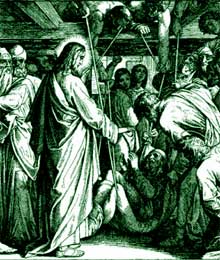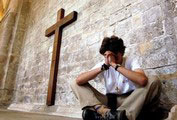|









|
|
- The paralytic was forgiven
and healed
- (Mathew 9, 1-8, Mark 2,
1-12, Luke5, 17-26)
Three evangelists, Mathew, Mark and Luke, told the same
story except for a few details about the forgiveness and the
healing of the paralytic. For the three of them, the man was
depicted as inert. The four men who carried him, as underlined
by Mark, brought him to Jesus. In the three stories, these men
have confidence in Jesus and expect some thing from him.
-

|
Mark and Luke explained the difficulty for them to reach Jesus
so that they managed to pass through the roof the man and his
stretcher by removing tiles to make a hole. They did not give
up. It is their confidence and determination that
made Jesus speak and act. "Seeing their confidence, Jesus
said…" The four men did not ask any thing. |
-
- They have acted and the paralytic himself did nothing
and did not ask. Since the time he was handicapped, he did not
know how to take the initiative, he was carried by others, supported
also by the confidence of the others like a child.
So much that in Mathew and Mark, Jesus talked to him by calling
him " child" To heal him of his handicap that isolated
him from the others and even himself, it was said to him "Your
sins are forgiven" because he was also cut off from God.
It is the real healing of which the physical healing is only
an illustration. It was what Jesus wanted to be understood by
the people, but instead he was accused of (the) blasphemy to
act like God since only He can remit sins. But Jesus did not
forgive by himself by announcing that the sins are forgiven,
and to confirm that the two healings are one he added: "
what is the easiest to say; " Your sins are forgiven"
or to say " Lift up yourself and walk?"
-

|
There was no intention to make guilty the paralysed man. It
was with some confidence, as Jesus encouraged him to have, that
he can be put back in a normal life and be active, Jesus asked
him to carry his stretcher. Being inserted again in the society,
he went to his home: reconciled with God because he was reconciled
with himself and with the others. He recovered his ability to
relate with the others and then finally to become himself. |
The power of Jesus is to heal, to stand by your self, in a proper
or figurative way, to break the fatality that prevents us to
act and to behave in a responsible and autonomous way. And all
that without having to ask. It is enough that others believe
in it for you. The mediation by the others here is very important
and gives courage to those who feel lost and have given up any
hope for a better future.
-
|
It is so far away from what is happening some times in our
churches for the sacrament of reconciliation, that makes you
feel guilty, that obliges you to plunge back into our misbehaving
in sinful ways or our little sins, to repent and to humiliate
oneself to be forgiven. |

|
-
- Nothing of that in this passage of the Gospel where nobody
is asking any thing but Jesus knew what hope these men were having
and knew what the sick man was needing. Jesus gave his command:
it is up to the renewed man to decide what to do accordingly.
It is not astonishing that the crowd in seeing this, showed their
surprise and admiration.
|
